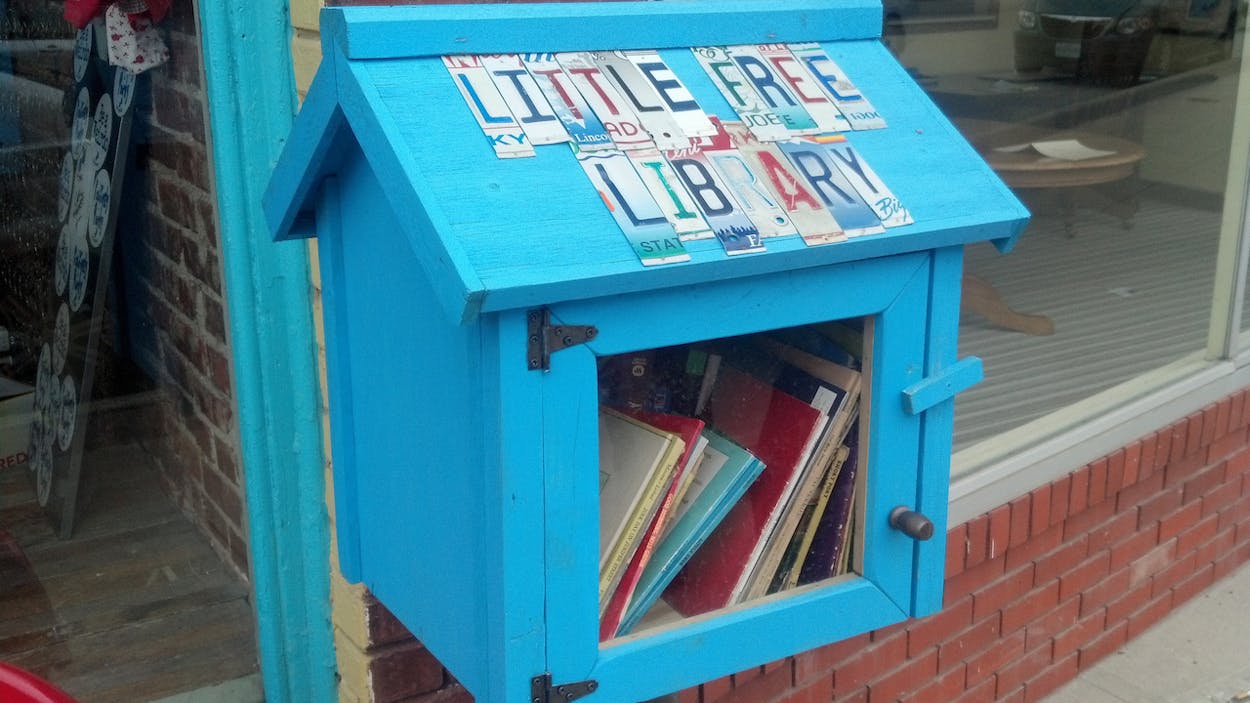Life is rough in Dallas right now. They’ve got no district attorney, no quarterback, and they’re about to have no police chief. The city leads the nation in income inequality by neighborhood. In the poorer of those neighborhoods, stray dogs roam the streets in packs. Tent cities for the homeless spring up almost as soon as they’re closed. But on Monday, Dallas City Council took a step to address one burning civic issue: the proliferation of Little Free Libraries that people have enjoyed putting up in their yards, so neighbors can take and share books with each other.
The Little Free Library was born in 2009 in Wisconsin, when a man named Todd Bol built a small model of a one-room schoolhouse to pay tribute to his mother, a schoolteacher. He put it on a post in his yard with a sign that read “free books,” and his neighbors began requesting their own. It went viral in the years that followed, and quickly became an international trend. There are tens of thousands of Little Free Libraries around the world now—in Norway, in Nigeria, in Guatemala—and hundreds and hundreds throughout Texas. You can take a book, then leave a book in a dozen front yards in the Rio Grande Valley, in a half-dozen in Lubbock or Tyler, and in close to a hundred in Austin. But in Dallas, putting a box in your front yard offering free books to anybody who wants to take one is about to come with restrictions. As Robert Wilonsky of the Dallas Morning News reports:
On Monday morning, a Dallas City Council committee signed off on a proposal that would limit the size and location of community book exchanges that have taken root in some two dozen Dallas residents’ front yards. As far as city officials can tell, if the full council gives its blessing, Dallas will become one of the only cities in the country to specifically regulate the take-a-book, leave-a-book boxes, which, in the past, have been subject to building laws and zoning codes.
And those rules would be as follows: The libraries can stand no taller than five feet and can be no wider than 20 inches and no deeper than 18 inches. In addition, anyone wanting to plant a Little Free Library in their front yard has to stay 10 feet away from a neighbor’s property line, and would be limited to a single structure per parcel.
Regulating Little Free Libraries—many of which don’t meet the proposed regulations in Dallas—sure seems like a solution in search of a problem. Wilonsky noted last November that the push to restrict them came after three anonymous calls led Dallas City Council to take up the issue. And though Dallas isn’t the only city to struggle with regulations around the boxes of books, it’s among the first to pass regulations targeting them specifically. Shreveport, Louisiana faced restrictions last year, but the community rallied change the zoning codes to keep the boxes. Los Angeles made headlines after actor Peter Cook’s Little Free Library came under fire, because the “obstruction” was built on public property. A nine-year-old boy in the Kansas City suburb of Leawood faced having his library shut down by the city, until he gave a straight-out-of-Capra speech to city council (standing on top of a milk crate!), which then amended the ordinance to allow his box, and others like it, to stay.
In Tempe, Arizona, meanwhile, citizens who install a Little Free Library on their property receive a $300 tax rebate. In Cleveland, the police department built one to improve community relations. So there are lots of ways for cities to deal with these things.
The complications that come with Little Free Libraries tend to be minimal. Dallas City Council expressed concern that they might become havens for pornography, a concern rebutted by the point that the owners of the libraries’ collections tend to be curated by the residents on a daily basis—if someone leaves smut in the box, it’s not going to be there long. In Austin, meanwhile, a rash of robberies hit a few Little Free Libraries earlier this summer, which Austin police declined to pursue because the libraries have the word “free” in the name. (Dallas-based Half Price Books refuses to buy books stamped with the organization’s “always a gift; never for sale” slogan, so library owners can remove the incentive for theft in that way.)
There’s still time for the Dallas City Council to walk back the vote, according to Wilonsky. The regulation that passed out of the committee has yet to be voted on by the full council, so Dallas can decide if it’s really a problem to tackle with such urgency.








